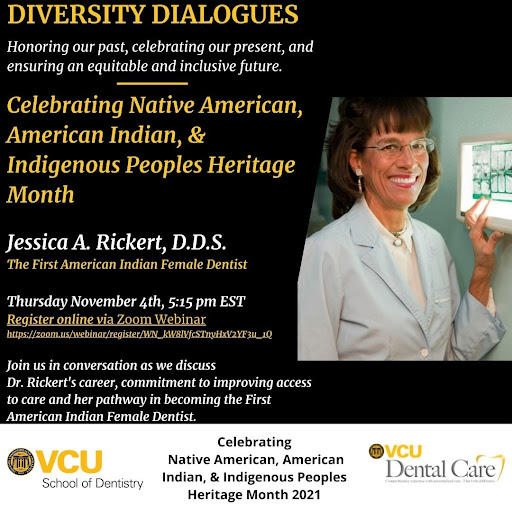Diversity Dialogues: Native American, American Indian and Indigenous Peoples Heritage Month 2021
Written by Dr. Carlos Smith, director of diversity, equity and inclusion at VCU School of Dentistry
Native American, American Indian and Indigenous Peoples Heritage Month, often referred to as National American Indian Heritage Month, is a time to celebrate rich and diverse cultures, traditions, and histories and to acknowledge the important contributions of Native people. Heritage Month is also an opportune time to educate the general public about tribes, to raise a general awareness about the unique challenges Native people have faced both historically and in the present, and the ways in which tribal citizens have worked to conquer these challenges.
The National Congress of American Indians is the oldest, largest and most representative American Indian and Alaska Native organization serving the broad interests of tribal governments and communities.
Were you aware of the following facts?
- American Indians and Alaskan Natives (AI/AN) currently suffer from the worst oral health outcomes in comparison to any racial or ethnic group within the United States.1
- The prevalence of untreated caries in AI/AN adults is twice that of an average American adult, and AI/AN people have the highest rate of caries of any ethnic group in the United States.2
- AI/AN adults, compared to the general U.S population, are more likely to have severe periodontal disease, more missing teeth, and are more likely to report poor state of oral health, higher prevalence of oral pain, and avoidance of certain foods due to the status of their oral health.2
- The oral health of AI/AN children is also of concern as the likelihood that they have untreated dental caries in primary teeth is twice that of an average American child in addition to having a five-fold likelihood to have permanent teeth with untreated dental caries.3
The Society of American Indian Dentists, formally organized in 1990, has as its mission to:
- Promote dental health in the American Indian Community
- Encourage American Indian Youth to pursue a career in the profession of dentistry
- Serve as a resource for assistance to American Indian Students interested in the profession of dentistry
- Provide role-model leadership
- Promote American Indian heritage and traditional values
- Promote and support the unique concerns of American Indian dentists
In celebration of Native American, American Indian, & Indigenous Peoples Heritage Month, we will continue our virtual conversation series: Diversity Dialogues – Honoring our past, celebrating our present and ensuring an equitable and inclusive future.
Please join us on Thursday, November 4 at 5:15 p.m. for a conversation with Dr. Jessica A. Rickert, the first American Indian female dentist, and our own Dr. Carlos Smith, director of diversity, equity and inclusion. Register directly for the Zoom webinar here.

References:
- Heaton, B., Crawford, A., Garcia, R. I., Henshaw, M., Riedy, C. A., Barker, J. C., … & Native Oral Health Project. (2017). Oral health beliefs, knowledge, and behaviors in Northern California American Indian and Alaska Native mothers regarding early childhood caries. Journal of public health dentistry, 77(4), 350-359.
- Phipps K.R. & Ricks T.L. (2016, March). The oral health of American Indian and Alaska Native adult dental patients: results of the 2015 IHS oral health survey. Indian Health Service data brief. Rockville, MD: Indian Health Service.
- Phipps K.R. & Ricks T.L. (2017, April). The oral health of American Indian and Alaska Native children aged 6-9 years: results of the 2016-2017 IHS oral health survey. Indian Health Service data brief. Rockville, MD: Indian Health Service.